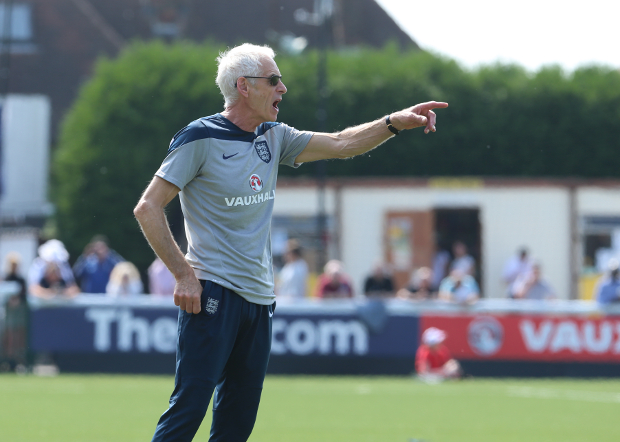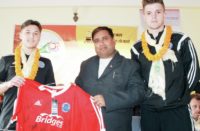By Jon Couch
PUTTING the world to rights over the England C breakfast table, the subject quickly switches to managers.
Slaven Bilic had just lost his job at West Ham and wily Paul Fairclough was left once again to fight the corner of the manager’s union in this cut-throat hire-and-fire culture that has engulfed the modern-day game.
Not that he’s had much practice at picking up his P45. In a management career spanning 29 years, the 67-year-old has only ever took charge of three clubs and is on the verge of becoming the longest-serving England manager of all time.
An unbroken 14 years in charge of the Three Lions – two behind England’s first post-war boss Sir Walter Winterbottom – there’s not a lot the former Hertford Town, Stevenage and Barnet chief doesn’t know about life in the manager’s hotseat – and he’s got nothing but sympathy for the young managers who are carrying the can.
“We are in a ‘now’ society with everything these days, aren’t we,” reflected Fairclough, relaxed, leant back on his chair with one knee straddling the other.
“The longest contract you are going to get these days is two years, so it’s hard for them to build a legacy at a football club and develop a brand of football, like Sir Alex Ferguson did at Manchester United.
“I remember interviewing Ronald Koeman when I was fortunate be involved in a project with Nike. He was manager of the Barcelona reserve team at the time and he talked about developing the Barcelona brand. That’s what he tried to do at Everton, but sometimes it goes wrong and the next thing you know, you are out.
“Football managers have all got one thing in common and that is we are winners. We want to win things and when you want to win things you have to keep on your toes all the time, and keep looking over your shoulder.
“A lot of chairmen these days tend to sing when they are winning. I can understand that really, they put the money in and develop business plans, but the times when managers need support, they don’t always get it.
“Good managers don’t become poor managers overnight, they just need support through difficult times. Managers won’t like admitting it, but fear comes into it. Panic sets in and there’s so much at stake now, it’s a natural effect to blame other people, but it should be equally as natural to support your manager the best you can.”
Fairclough, though, is a rare breed in managers these days it seems. After two years learning his trade at Hertford Town, the former Liverpool academy graduate took over at Stevenage Borough with a 10-year plan of taking the Hertfordshire club from the Isthmian Division Two North into the Football League.
In year six, with four promotions and his place in club folklore safely under his belt, Fairclough was on the verge of achieving the impossible in double quick time when disaster struck. On finally taking Boro to the Conference title in 1995-96, Fairclough’s dream was shattered by the decision to deny Stevenage promotion to the Football League due to insufficient facilities at Broadhall Way – a decision which still irks him today.
“I had a ten-year plan and nearly choked when it came six,” he said.
“When I was very young I really believed I was the next best thing and that doors were going to open left, right and centre. But they never did because I’d never played at pro level, so I had to devise a plan to get into the Football League. So to be denied promotion by the High Court was devastating. I couldn’t believe they ruled against us.
“At the time we were in pre-season training and the players didn’t know whether they were going to be playing in the Football League or the Conference.
“I had players like Barry Hayles being looked at by other clubs and I had to let them fly the nest. After cracking on at it for three years I set myself up as a victim, blaming everyone else but myself and I ended up being sacked after 10 years at the club.”
It wasn’t all doom and gloom though. The following season, Fairclough famously led Boro to the fourth round of the FA Cup where a controversial tie with an Alan Shearer-inspired Newcastle made headlines all over the world with no fewer than 16 international film crews coming down to film one particular training session
“The tie had everything, including the bullying element to it,” Fairclough recalls.
“Our chairman at the time, Victor Green, was very good at manipulating the press and Newcastle responded in completely the wrong way when the draw was made.
“They didn’t want to play the tie at Broadhall Way and the day after the draw, they brought some of their heavy gang down on the train, suited and booted, without any kind of announcement, to inspect our facilities.
“When our chairman found out they were coming he got the TV cameras ready waiting for them at Stevenage station.
“Newcastle were portrayed as the big bad bullies trying to quash the little ant and it captivated the world.
“Shearer was making a comeback from injury and we talked about how [Keith] Gillespie would run down the wing, cross it in for Shearer to score and wheel away with his arm aloft, and that’s exactly what happened.
“It was a great moment when Guiliano Grazioli got the goal back to take us to a replay. We got half what we wanted out of the game, then it all kicked off in the replay at St James’ with Shearer’s controversial goal which the lads still, to this day, insist didn’t cross the line.
“When we got the goal back in the replay, I remember looking across at their bench and they turned white with horror. It was a great occasion.”
Thankfully, the next time Fairclough rubbed shoulders with the big boys, it was a far more sedate affair. A trip to Old Trafford as the mighty Manchester United faced his Barnet side in the 2005 League Cup, and although the Bees went down 4-1 that day, Fairclough returned with memories for life.
“Meeting Sir Alex Ferguson was great. He was very warm, posed for photographs before and after the game and invited me in for the proverbial glass of wine in his office afterwards.
“He didn’t have his strongest side out, but he still had some class acts in that game like Wes Brown and Gerard Pique, now at Barcelona. But I looked hard at that side beforehand and I really felt we had a chance because they didn’t have all their household names, but having my goalkeeper [Ross Flitney] sent off after one minute, 40 seconds…well, that didn’t help.”
So, while the likes of Bilic, Koeman and countless other top managers are looking for work, Fairclough, with his core, old-school values, continues to go from strength to strength.
It’s highly unlikely Gareth Southgate will be afforded 14 years in the England hotseat, but Fairclough and England C, it seems, go hand in hand. Not that the wily boss is taking anything for granted.
“No one is safe from their job, whatever level you are, so I’m not going to make statements about having a job for life,” he added.
“I believe I have deserved to have my contract extended by the FA when I have done because I believe I’ve kept on top with the coaching, kept myself fresh and freshened the staff. In football, you can never sit back and relax. I’ve never rested with this job and although I’m not a paid employee of the FA, I am a consultant to the FA, that’s how I’m perceived. I want to continue with it because I’m passionate about what we do for the young players in this country.”
“I wax lyrical about what England C does to the players, but I’m not deluded, the majority of the credit is with the managers and the coaches of their clubs, their bread and butter each week. They do a great job, all of them.
“They’ve cut the diamond, polishing all edges of that diamond, I just polish that last little edge and make it shine on the international stage.”
*This article originally featured in The @NonLeaguePaper, which is available every Sunday.























